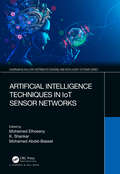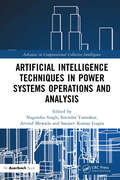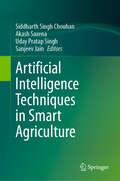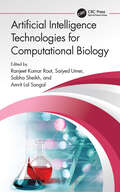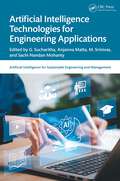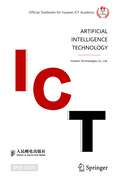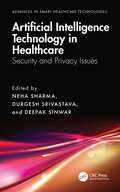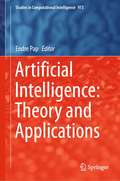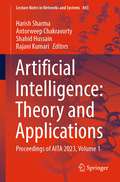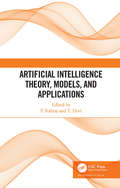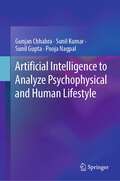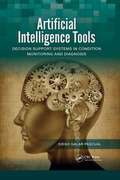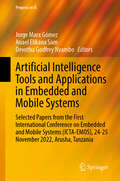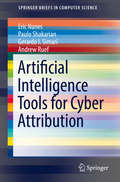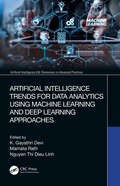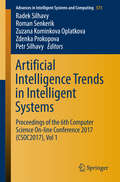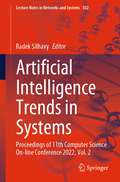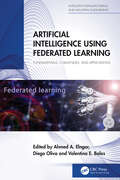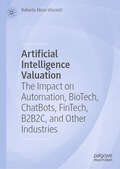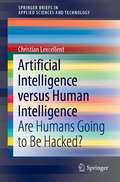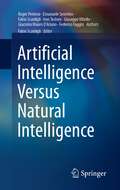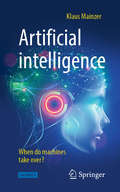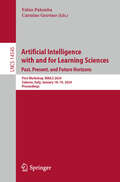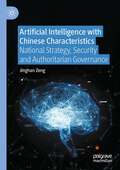- Table View
- List View
Artificial Intelligence Techniques in IoT Sensor Networks (Chapman & Hall/CRC Distributed Sensing and Intelligent Systems Series)
by Mohamed Elhoseny K. Shankar Mohamed Abdel-BassetArtificial Intelligence Techniques in IoT Sensor Networks is a technical book which can be read by researchers, academicians, students and professionals interested in artificial intelligence (AI), sensor networks and Internet of Things (IoT). This book is intended to develop a shared understanding of applications of AI techniques in the present and near term. The book maps the technical impacts of AI technologies, applications and their implications on the design of solutions for sensor networks. This text introduces researchers and aspiring academicians to the latest developments and trends in AI applications for sensor networks in a clear and well-organized manner. It is mainly useful for research scholars in sensor networks and AI techniques. In addition, professionals and practitioners working on the design of real-time applications for sensor networks may benefit directly from this book. Moreover, graduate and master’s students of any departments related to AI, IoT and sensor networks can find this book fascinating for developing expert systems or real-time applications. This book is written in a simple and easy language, discussing the fundamentals, which relieves the requirement of having early backgrounds in the field. From this expectation and experience, many libraries will be interested in owning copies of this work.
Artificial Intelligence Techniques in Power Systems Operations and Analysis (Advances in Computational Collective Intelligence)
by Nagendra Singh Sitendra Tamrakar Arvind Mewada Sanjeev Kumar GuptaAn electrical power system consists of a large number of generation, transmission, and distribution subsystems. It is a very large and complex system; hence, its installation and management are very difficult tasks. An electrical system is essentially a very large network with very large data sets. Handling these data sets can require much time to analyze and subsequently implement. An electrical system is necessary but also potentially very dangerous if not operated and controlled properly. The demand for electricity is ever increasing, so maintaining load demand without overloading the system poses challenges and difficulties. Thus, planning, installing, operating, and controlling such a large system requires new technology. Artificial intelligence (AI) applications have many key features that can support a power system and handle overall power system operations. AI-based applications can manage the large data sets related to a power system. They can also help design power plants, model installation layouts, optimize load dispatch, and quickly respond to control apparatus. These applications and their techniques have been successful in many areas of power system engineering. Artificial Intelligence Techniques in Power Systems Operations and Analysis focuses on the various challenges arising in power systems and how AI techniques help to overcome these challenges. It examines important areas of power system analysis and the implementation of AI-driven analysis techniques. The book helps academicians and researchers understand how AI can be used for more efficient operation. Multiple AI techniques and their application are explained. Also featured are relevant data sets and case studies. Highlights include: Power quality enhancement by PV-UPQC for non-linear load Energy management of a nanogrid through flair of deep learning from IoT environments Role of artificial intelligence and machine learning in power systems with fault detection and diagnosis AC power optimization techniques Artificial intelligence and machine learning techniques in power systems automation
Artificial Intelligence Techniques in Smart Agriculture
by Siddharth Singh Chouhan Akash Saxena Uday Pratap Singh Sanjeev JainThis edited volume explores the integration of artificial intelligence to improve crop production. It addresses the critical need for intelligent crop management in light of the world's escalating population. Encompassing a spectrum of technologies, including computer vision, image processing, soft computing, machine learning, and deep learning, the book explores advancements in decision-making systems. It integrates data science methodologies, Internet of Things, wireless communications, and a range of sensors and actuators to provide precise, timely, and cost-effective solutions to agricultural challenges, ultimately enhancing both the quality and quantity of crop yields. The book empowers its audience to direct their efforts towards designing models and prototypes that benefit society and the environment, making it an indispensable resource for those eager to shape the future of intelligent agriculture. It serves as a comprehensive guide for students, scholars, and academicians keen on delving into the transformative field of artificial intelligence in agriculture. Researchers, scientists, and field experts will find invaluable insights to guide their exploration and contribution to this domain.
Artificial Intelligence Technologies for Computational Biology
by Ranjeet Kumar Rout Saiyed Umer Sabha Sheikh Amrit Lal SangalThis text emphasizes the importance of artificial intelligence techniques in the field of biological computation. It also discusses fundamental principles that can be applied beyond bio-inspired computing.It comprehensively covers important topics including data integration, data mining, machine learning, genetic algorithms, evolutionary computation, evolved neural networks, nature-inspired algorithms, and protein structure alignment. The text covers the application of evolutionary computations for fractal visualization of sequence data, artificial intelligence, and automatic image interpretation in modern biological systems.The text is primarily written for graduate students and academic researchers in areas of electrical engineering, electronics engineering, computer engineering, and computational biology.This book:• Covers algorithms in the fields of artificial intelligence, and machine learning useful in biological data analysis.• Discusses comprehensively artificial intelligence and automatic image interpretation in modern biological systems.• Presents the application of evolutionary computations for fractal visualization of sequence data.• Explores the use of genetic algorithms for pair-wise and multiple sequence alignments.• Examines the roles of efficient computational techniques in biology.
Artificial Intelligence Technologies for Engineering Applications (Artificial Intelligence for Sustainable Engineering and Management)
by G. Sucharitha Anjanna Matta M. Srinivas Sachi Nandan MohantyThis book enables the readers to design, optimize, and control complex systems with greater precision and efficiency. It further provides practical insights and presents case studies for readers interested in exploring the intersections between artificial intelligence and industry. This book discusses important topics such as algorithmic design, mathematical modeling, natural language processing, machine learning, and computer vision.This book: Explores practical applications of artificial intelligence in engineering, including optimization, predictive modeling, decision‑making, and control systems Provides real‑world examples of the applications of artificial intelligence in engineering, drawing from a range of industries, including aerospace, automotive, and manufacturing Discusses technologies such as machine learning and computer vision for aircraft design optimization, fault diagnosis, and autonomous navigation Explains natural language processing for analyzing and optimizing building systems, while robotics can be used for construction automation Presents artificial intelligence technologies for optimization of manufacturing processes, predictive maintenance, and quality control This book is primarily written for senior undergraduates, graduate students, and academic researchers in the fields of electrical engineering, electronics and communications engineering, computer science and engineering, and information technology.
Artificial Intelligence Technology
by Huawei Technologies Co., Ltd.This open access book aims to give our readers a basic outline of today’s research and technology developments on artificial intelligence (AI), help them to have a general understanding of this trend, and familiarize them with the current research hotspots, as well as part of the fundamental and common theories and methodologies that are widely accepted in AI research and application. This book is written in comprehensible and plain language, featuring clearly explained theories and concepts and extensive analysis and examples. Some of the traditional findings are skipped in narration on the premise of a relatively comprehensive introduction to the evolution of artificial intelligence technology. The book provides a detailed elaboration of the basic concepts of AI, machine learning, as well as other relevant topics, including deep learning, deep learning framework, Huawei MindSpore AI development framework, Huawei Atlas computing platform, Huawei AI open platform for smart terminals, and Huawei CLOUD Enterprise Intelligence application platform. As the world’s leading provider of ICT (information and communication technology) infrastructure and smart terminals, Huawei’s products range from digital data communication, cyber security, wireless technology, data storage, cloud computing, and smart computing to artificial intelligence.
Artificial Intelligence Technology in Healthcare: Security and Privacy Issues (Advances in Smart Healthcare Technologies)
by Neha Sharma Durgesh Srivastava Deepak SinwarArtificial Intelligence Technology in Healthcare: Security and Privacy Issues focuses on current issues with patients’ privacy and data security including data breaches in healthcare organizations, unauthorized access to patients’ information, and medical identity theft. It explains recent breakthroughs and problems in deep learning security and privacy issues, emphasizing current state-of-the-art methods, methodologies, implementation, attacks, and countermeasures. It examines the issues related to developing artifiicial intelligence (AI)-based security mechanisms which can gather or share data across several healthcare applications securely and privately. Features: Combines multiple technologies (i.e., Internet of Things [IoT], Federated Computing, and AI) for managing and securing smart healthcare systems. Includes state-of-the-art machine learning, deep learning techniques for predictive analysis, and fog and edge computing-based real-time health monitoring. Covers how to diagnose critical diseases from medical imaging using advanced deep learning-based approaches. Focuses on latest research on privacy, security, and threat detection on COVID-19 through IoT. Illustrates initiatives for research in smart computing for advanced healthcare management systems. This book is aimed at researchers and graduate students in bioengineering, artificial intelligence, and computer engineering.
Artificial Intelligence: Theory and Applications (Studies in Computational Intelligence #973)
by Endre PapThis book is an up-to-date collection, in AI and environmental research, related to the project ATLAS. AI is used for gaining an understanding of complex research phenomena in the environmental sciences, encompassing heterogeneous, noisy, inaccurate, uncertain, diverse spatio-temporal data and processes. The first part of the book covers new mathematics in the field of AI: aggregation functions with special classes such as triangular norms and copulas, pseudo-analysis, and the introduction to fuzzy systems and decision making. Generalizations of the Choquet integral with applications in decision making as CPT are presented. The second part of the book is devoted to AI in the geo-referenced air pollutants and meteorological data, image processing, machine learning, neural networks, swarm intelligence, robotics, mental well-being and data entry errors. The book is intended for researchers in AI and experts in environmental sciences as well as for Ph.D. students.
Artificial Intelligence: Proceedings of AITA 2023, Volume 1 (Lecture Notes in Networks and Systems #843)
by Harish Sharma Antorweep Chakravorty Shahid Hussain Rajani KumariThis book features a collection of high-quality research papers presented at International Conference on Artificial Intelligence: Theory and Applications (AITA 2023), held during 11–12 August 2023 in Bengaluru, India. The book is divided into two volumes and presents original research and review papers related to artificial intelligence and its applications in various domains including health care, finance, transportation, education, and many more.
Artificial Intelligence Theory, Models, and Applications
by P. KalirajThis book examines the fundamentals and technologies of Artificial Intelligence (AI) and describes their tools, challenges, and issues. It also explains relevant theory as well as industrial applications in various domains, such as healthcare, economics, education, product development, agriculture, human resource management, environmental management, and marketing. The book is a boon to students, software developers, teachers, members of boards of studies, and researchers who need a reference resource on artificial intelligence and its applications and is primarily intended for use in courses offered by higher education institutions that strive to equip their graduates with Industry 4.0 skills. FEATURES: Gender disparity in the enterprises involved in the development of AI-based software development as well as solutions to eradicate such gender bias in the AI world A general framework for AI in environmental management, smart farming, e-waste management, and smart energy optimization The potential and application of AI in medical imaging as well as the challenges of AI in precision medicine AI’s role in the diagnosis of various diseases, such as cancer and diabetes The role of machine learning models in product development and statistically monitoring product quality Machine learning to make robust and effective economic policy decisions Machine learning and data mining approaches to provide better video indexing mechanisms resulting in better searchable results ABOUT THE EDITORS: Prof. Dr. P. Kaliraj is Vice Chancellor at Bharathiar University, Coimbatore, India. Prof. Dr. T. Devi is Professor and Head of the Department of Computer Applications, Bharathiar University, Coimbatore, India.
Artificial Intelligence to Analyze Psychophysical and Human Lifestyle
by Gunjan Chhabra Sunil Kumar Sunil Gupta Pooja NagpalThis book is about the use of technology/artificial intelligence in the areas of human behavior and psychology, health and nutrition, and fitness and sports. Everybody has his/her own lifestyle but may not necessarily be aware of what constitutes a healthy lifestyle. Knowledge gained from the Internet may be scattered and inaccurate and, if adhered to, may lead to loss of life. The COVID-19 pandemic increased people's awareness of the need for a healthy lifestyle but how to adopt a healthy lifestyle is something to be clarified since every individual is different (body type, situation, etc.), and hence, their needs will be different as well. This book addresses such questions and explores how the use of technology in the areas mentioned above can enable each individual to easily achieve a healthy lifestyle.
Artificial Intelligence to Assist Mathematical Reasoning: Proceedings Of A Workshop
by National Academies of Sciences, Engineering, and Medicine Division on Engineering and Physical Sciences Board on Mathematical Sciences and AnalyticsArtificial intelligence (AI) has the potential to aid new mathematical discoveries. Particularly as the amount of data available grows beyond what any person can study, AI can be useful in its power to identify patterns in data and refine relationships between properties. Sponsored by the National Science Foundation, the National Academies of Sciences, Engineering, and Medicine Board on Mathematical Sciences and Analytics convened a 3-day public virtual workshop on June 12-14, 2023, to bring together stakeholders to discuss the state of the art and current challenges and opportunities to advance research in using AI for mathematical reasoning. This publication summarizes the presentations and discussion of the workshop.
Artificial Intelligence Tools: Decision Support Systems in Condition Monitoring and DIagnosis
by Diego Galar PascualArtificial Intelligence Tools: Decision Support Systems in Condition Monitoring and Diagnosis discusses various white- and black-box approaches to fault diagnosis in condition monitoring (CM). This indispensable resource:Addresses nearest-neighbor-based, clustering-based, statistical, and information theory-based techniquesConsiders the merits of e
Artificial Intelligence Tools and Applications in Embedded and Mobile Systems: Selected Papers from the First International Conference on Embedded and Mobile Systems (ICTA-EMOS), 24-25 November 2022, Arusha, Tanzania (Progress in IS)
by Jorge Marx Gómez Anael Elikana Sam Devotha Godfrey NyamboThe emergence of Artificial Intelligence (AI) has had a tremendous impact on embedded and mobile systems. This book presents a diverse collection of papers that showcase cutting-edge research and practical applications of AI in this field. The peer-reviewed research articles stem from the First International Conference on Embedded and Mobile Systems (ICTA-EMOS), which was held on November 24th – 25th, 2022, in Arusha, Tanzania, East Africa. They demonstrate the breadth and depth of AI’s impact across various domains, exploring topics such as healthcare advances, transportation optimization, sustainable solutions, and business and process optimization.
Artificial Intelligence Tools for Cyber Attribution ( SpringerBriefs in Computer Science)
by Gerardo I. Simari Paulo Shakarian Eric Nunes Andrew RuefThis SpringerBrief discusses how to develop intelligent systems for cyber attribution regarding cyber-attacks. Specifically, the authors review the multiple facets of the cyber attribution problem that make it difficult for “out-of-the-box” artificial intelligence and machine learning techniques to handle. <P><P> Attributing a cyber-operation through the use of multiple pieces of technical evidence (i.e., malware reverse-engineering and source tracking) and conventional intelligence sources (i.e., human or signals intelligence) is a difficult problem not only due to the effort required to obtain evidence, but the ease with which an adversary can plant false evidence.<P> This SpringerBrief not only lays out the theoretical foundations for how to handle the unique aspects of cyber attribution – and how to update models used for this purpose – but it also describes a series of empirical results, as well as compares results of specially-designed frameworks for cyber attribution to standard machine learning approaches.<P> Cyber attribution is not only a challenging problem, but there are also problems in performing such research, particularly in obtaining relevant data. This SpringerBrief describes how to use capture-the-flag for such research, and describes issues from organizing such data to running your own capture-the-flag specifically designed for cyber attribution. Datasets and software are also available on the companion website.
Artificial Intelligence Trends for Data Analytics Using Machine Learning and Deep Learning Approaches (Artificial Intelligence (AI): Elementary to Advanced Practices)
by K. Gayathri Devi Mamata Rath Nguyen Thi Dieu LinhArtificial Intelligence (AI), when incorporated with machine learning and deep learning algorithms, has a wide variety of applications today. This book focuses on the implementation of various elementary and advanced approaches in AI that can be used in various domains to solve real-time decision-making problems. The book focuses on concepts and techniques used to run tasks in an automated manner. It discusses computational intelligence in the detection and diagnosis of clinical and biomedical images, covers the automation of a system through machine learning and deep learning approaches, presents data analytics and mining for decision-support applications, and includes case-based reasoning, natural language processing, computer vision, and AI approaches in real-time applications. Academic scientists, researchers, and students in the various domains of computer science engineering, electronics and communication engineering, and information technology, as well as industrial engineers, biomedical engineers, and management, will find this book useful. By the end of this book, you will understand the fundamentals of AI. Various case studies will develop your adaptive thinking to solve real-time AI problems. Features Includes AI-based decision-making approaches Discusses computational intelligence in the detection and diagnosis of clinical and biomedical images Covers automation of systems through machine learning and deep learning approaches and its implications to the real world Presents data analytics and mining for decision-support applications Offers case-based reasoning
Artificial Intelligence Trends in Intelligent Systems: Proceedings of the 6th Computer Science On-line Conference 2017 (CSOC2017), Vol 1 (Advances in Intelligent Systems and Computing #573)
by Radek Silhavy Roman Senkerik Zuzana Kominkova Oplatkova Petr Silhavy Zdenka ProkopovaThis book presents new methods and approaches to real-world problems as well as exploratory research that describes novel artificial intelligence applications, including deep learning, neural networks and hybrid algorithms. This book constitutes the refereed proceedings of the Artificial Intelligence Trends in Intelligent Systems Section of the 6th Computer Science On-line Conference 2017 (CSOC 2017), held in April 2017.
Artificial Intelligence Trends in Systems: Proceedings of 11th Computer Science On-line Conference 2022, Vol. 2 (Lecture Notes in Networks and Systems #502)
by Radek SilhavyThis book covers themes related to artificial intelligence in systems and networks application. Selected papers explore modern neural networks application, optimization and hybrid and bio-inspired algorithms are covered too. The refereed proceedings of the Artificial Intelligence Trends in Systems part of the 11th Computer Science On-line Conference 2022 (CSOC 2022), conducted online in April 2022, are included in this volume.
Artificial Intelligence Using Federated Learning: Fundamentals, Challenges, and Applications (Intelligent Manufacturing and Industrial Engineering)
by Ahmed A. Elngar Diego Oliva Valentina E. BalasFederated machine learning is a novel approach to combining distributed machine learning, cryptography, security, and incentive mechanism design. It allows organizations to keep sensitive and private data on users or customers decentralized and secure, helping them comply with stringent data protection regulations like GDPR and CCPA.Artificial Intelligence Using Federated Learning: Fundamentals, Challenges, and Applications enables training AI models on a large number of decentralized devices or servers, making it a scalable and efficient solution. It also allows organizations to create more versatile AI models by training them on data from diverse sources or domains. This approach can unlock innovative use cases in fields like healthcare, finance, and IoT, where data privacy is paramount.The book is designed for researchers working in Intelligent Federated Learning and its related applications, as well as technology development, and is also of interest to academicians, data scientists, industrial professionals, researchers, and students.
Artificial Intelligence Valuation: The Impact on Automation, BioTech, ChatBots, FinTech, B2B2C, and Other Industries
by Roberto Moro-ViscontiThe book discusses the main valuation methodologies of artificial intelligence (AI). Company valuation goes hand in hand with estimating intangible assets like AI, which are linked to higher risk and lower collateral value. Their accounting is controversial, and the most widely used valuation approaches are based on market, income, or cost-related metrics.The volume discusses in detail the valuation approaches such as the discounted cash flows (remembering that “cash is king”) or the empirical market multipliers and comparables. The approaches are complemented by several models, including advanced business planning that incorporates machine learning, digital scalability networks, or validating blockchains. The book, with a tailor-made theoretical background backed by empirical cases, shows how to evaluate AI products, such as chatbots or virtual assistants, for AI established producers, startups, or traditional “brick-and-mortar” AI users. The comprehensive set of techniques and methodologies will interest researchers, students, and practitioners in corporate finance, intellectual property valuation, and financial technology.
Artificial Intelligence versus Human Intelligence: Are Humans Going to Be Hacked? (SpringerBriefs in Applied Sciences and Technology)
by Christian LexcellentThis book showcases the fascinating but problematic relationship between human intelligence and artificial intelligence: AI is often discussed in the media, as if bodiless intelligence could exist, without a consciousness, without an unconscious, without thoughts. Using a wealth of anecdotes, data from academic literature, and original research, this short book examines in what circumstances robots can replace humans, and demonstrates that by operating beyond direct human control, strong artificial intelligence may pose serious problems, paving the way for all manner of extrapolations, for example implanting silicon chips in the brains of a privileged caste, and exposing the significant gap still present between the proponents of "singularity" and certain philosophers. With insights from mathematics, cognitive neuroscience and philosophy, it enables readers to understand and continue this open debate on AI, which presents concrete ethical problems for which meaningful answers are still in their infancy.
Artificial Intelligence Versus Natural Intelligence
by Roger Penrose Emanuele Severino Fabio Scardigli Ines Testoni Giuseppe Vitiello Giacomo Mauro D'Ariano Federico FagginThis book centers around a dialogue between Roger Penrose and Emanuele Severino about one of most intriguing topics of our times, the comparison of artificial intelligence and natural intelligence, as well as its extension to the notions of human and machine consciousness.Additional insightful essays by Mauro D'Ariano, Federico Faggin, Ines Testoni, Giuseppe Vitiello and an introduction of Fabio Scardigli complete the book and illuminate different aspects of the debate. Although from completely different points of view, all the authors seem to converge on the idea that it is almost impossible to have real "intelligence" without a form of "consciousness". In fact, consciousness, often conceived as an enigmatic "mirror" of reality (but is it really a mirror?), is a phenomenon under intense investigation by science and technology, particularly in recent decades. Where does this phenomenon originate from (in humans, and perhaps also in animals)? Is it reproducible on some "device"? Do we have a theory of consciousness today? Will we arrive to build thinking or conscious machines, as machine learning, or cognitive computing, seem to promise? These questions and other related issues are discussed in the pages of this work, which provides stimulating reading to both specialists and general readers.The Chapter "Hard Problem and Free Will: An Information-Theoretical Approach" is available open access under a Creative Commons Attribution 4.0 International License via link.springer.com.
Artificial intelligence - When do machines take over? (Technik im Fokus)
by Klaus MainzerEverybody knows them. Smartphones that talk to us, wristwatches that record our health data, workflows that organize themselves automatically, cars, airplanes and drones that control themselves, traffic and energy systems with autonomous logistics or robots that explore distant planets are technical examples of a networked world of intelligent systems. Machine learning is dramatically changing our civilization. We rely more and more on efficient algorithms, because otherwise we will not be able to cope with the complexity of our civilizing infrastructure. But how secure are AI algorithms? This challenge is taken up in the 2nd edition: Complex neural networks are fed and trained with huge amounts of data (big data). The number of necessary parameters explodes exponentially. Nobody knows exactly what is going on in these "black boxes". In machine learning we need more explainability and accountability of causes and effects in order to be able to decide ethical and legal questions of responsibility (e.g. in autonomous driving or medicine)! Besides causal learning, we also analyze procedures of tests and verification to get certified AI-programs. Since its inception, AI research has been associated with great visions of the future of mankind. It is already a key technology that will decide the global competition of social systems. "Artificial Intelligence and Responsibility" is another central supplement to the 2nd edition: How should we secure our individual liberty rights in the AI world? This book is a plea for technology design: AI must prove itself as a service in society.
Artificial Intelligence with and for Learning Sciences. Past, Present, and Future Horizons: First Workshop, WAILS 2024, Salerno, Italy, January 18-19, 2024, Proceedings (Lecture Notes in Computer Science #14545)
by Fabio Palomba Carmine GravinoThis book constitutes the refereed conference proceedings of the First Workshop on Artificial Intelligence with and for Learning Sciences - Past, Present, and Future Horizons, WAILS 2024, held in Salerno, Italy, during January 18-19, 2024. The 14 full papers and 5 short papers presented in this book were carefully reviewed. The contributions present and discuss previous achievements, current challenges and solutions, and future perspectives concerned with the adoption of artificial intelligence methods and techniques in the context of learning sciences.
Artificial Intelligence with Chinese Characteristics: National Strategy, Security and Authoritarian Governance
by Jinghan Zeng“This book provides the first book-lengthy study focusing on Artificial Intelligence (AI) with Chinese characteristics, in line with China’s open ambition of becoming an AI superpower by 2030. China’s unique domestic politics has developed distinct characteristics for its AI approach. By analysing national strategy, security and governance aspects of AI in China, this book argues that China’s AI approach is sophisticated and multifaceted, and it has brought about both considerable benefits and challenges to China. First, many characterize China’s AI approach as a nationally concerted top-down geopolitical strategy to advance Beijing’s unified objective. This book argues that this view is mistaken. It shows that China’s AI politics is largely shaped by economically rather than geopolitically motivated domestic stakeholders. In addition, China’s national AI plan is an upgrade of existing local AI initiatives to the national level, reflecting a bottom-up development. Thus, China’s AI strategy is more of a political manifesto rather than a concrete policy plan. The second part of the book discusses how the Chinese central government has been securitizing AI in order to mobilize local states, market actors, intellectuals and the general public. This security discourse is built on China’s historical anxieties about technology, regime security needs and the growing tension caused by great power competition. Despite its help in convincing domestic actors, however, this securitization trend may undermine key AI objectives. The third part of the book studies the Chinese governance approach to the use of AI. It argues that China’s bold AI practices are part of its broad and incoherent adaptation strategy to governance by digital means. AI is part of a digital technology package that the Chinese authoritarian regime has actively employed not only to improve public services but also to strengthen its authoritarian governance. While China’s AI progress benefits from its unique political and social environment, its ambitious AI plan contains considerable risks. China’s approach is gambling on its success in (a) delivering a booming AI economy, (b) ensuring a smooth social transformation to the age of AI, and (c) proving ideological superiority of its authoritarian and communist values. This book suggests that a more accurate understanding of AI with Chinese characteristics is essential in order to inform the debate regarding what lessons can be learnt from China’s AI approach and how to respond to China’s rise as the AI leader if not superpower.”
